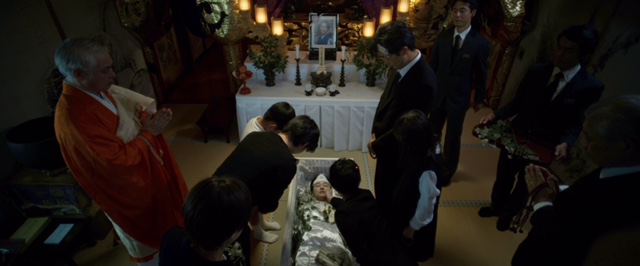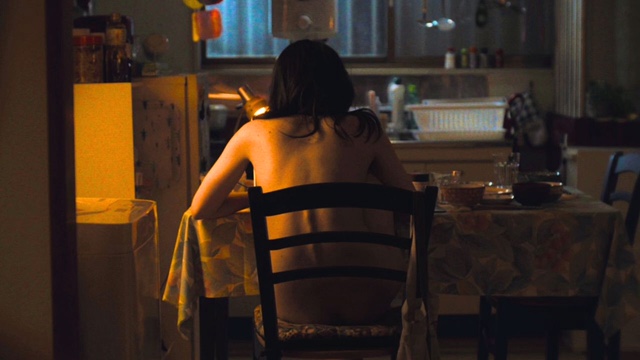The Story of the Woman Who Scripted Her Own Funeral
by Kaori Shoji
Noriko Yuasa strikes you as the kind of person who locks eyes with every bull that dares cross her path, grabs it by the horns, and makes it clear who’s in charge. Ambitious and unrelenting, Yuasa was employed by a media production company right out of university and often she worked so hard that she sometimes slept standing up and leaning against the office copier. At 36 she went solo to become that rare creature in the Japanese media: an independent female filmmaker and screenwriter. Any Japanese woman who has worked in the industry knows the near impossibility of pulling this off. Cliches like ‘gutsy’ and ‘force of nature’ come to mind but they sound like disrespectful understatements.

paying last respects to Kaoru and reminiscing over her life
Performing Kaoru’s Funeral is Yuasa’s second commercial feature and a joint project with funding and staff participation from Spain and Singapore. After the Japan release on November 22, the film is slated to travel to Nepal and Bangladesh and onto the international film festival circuit. Yuasa had managed to crowdfund, set up an international team and carry out the filming and offshore post-production – all in the midst of the pandemic chaos. According to an interview found on the net by producer Mika Shimoeda, the entire crew and cast faced multiple set-backs, extensions and do-overs. But for both Yuasa and Shimoeda, “giving up” had never been part of their vocabulary.
The film is an engrossing 100 minutes that tracks the beginning and end of a Japanese funeral, interspersed with the story of a boy and girl who meet, marry and divorce. Ten years later, the girl winds up dead and the boy – now on the brink of middle age – is called upon to take charge of her funeral. Yuasa penned the original screenplay and in the film she can’t help riffing on the adage that original scripts in Japan have awful trouble getting greenlighted. One line goes: “Anime is the only exception. Otherwise, original scripts never, ever get off the ground.” Hah!
“Performing…” is also a funny, melancholic and classic Japanese love story. Classic because within the traditional Japanese relationship, a man and woman only realize the depth of their love for each other in the face of death, not in the life that they had shared together. Consider that a Japanese man often proposes by saying “let’s get buried in the same grave,” and a woman divorces him by saying “no way am I going in the same grave as you and your parents.” In Japan, marriage is a long, long haul that doesn’t ensure happiness, joy or sex but will probably guarantee a nice funeral and someone to hold your hand when you die. Which is perhaps, the point of getting married at all.
Also telling is that Kaoru (played by London-bred actress Kano Ichiki)’s funeral takes much longer than the day she got married, which consisted of a proposal in a karaoke box followed by an ecstatic embrace in the street. Her funeral is a long, protracted goodbye, and there’s a lot of entertainment value for every one of the guests – a chance to get rip roaring drunk, a chance to weep and admit to pent-up emotions, a chance to look long and hard into the face of a woman who loved you and whom you loved back, a chance to get lost in the woods and throw mud pies into each other’s faces.
Yuasa proffers little or no explanation of who Kaoru really was. She died after being hit by a truck on a remote road in Okayama, after getting off a shift at a factory that makes hot towels. She was 40 years old, and left a 9-year old daughter with the same name: Kaoru. She never disclosed the identity of her daughter’s father. When she was alive, she was a professional screenwriter who once won an important award. Enigmatically, she left a will with detailed instructions to her own funeral, including a request that the ceremonies be presided over by her ex-husband whom she hadn’t seen in a decade.
In Japan, marriage is a long, long haul that doesn’t ensure happiness, joy or sex but will probably guarantee a nice funeral and someone to hold your hand when you die. Which is perhaps, the point of getting married at all.
Kaoru’s ex is Yokotani (Koji Seki), an out-of-work actor who now makes a living by driving call girls to clients’ homes, wait around for the sessions to end and then driving the girls back again. In the opening segment, a girl calls him for help because a creepy client dared to kiss her thighs. The whole thing is set up to extract extra money from the client; the drill is that Yokotani comes thundering in, and accuses the client of abuse whereupon a bodyguard appears from nowhere to beat Yokotani up. The girl picks up 300,000 yen in cash as compensation, and a bloodied Yokotani drives her home. The job is pathetic and stupid but the only one available for many male freelancers during the pandemic, just as hordes of young women turned to sex work to support themselves.

Kaoru used to work all hours of the day and night, dressed or completely naked.
Yokotani is a nice enough guy but he’s bland to the point of numbness. When he gets the call from a funeral home in Okayama about Kaoru, he procures a black suit and boards the bullet train out of Tokyo. He arrives at the temple where the wake is to be held and barely manages to convey a sense of loss. When Yokotani and Kaoru were married, he failed one audition after the other while she wrote scripts on a laptop set up on the kitchen table. They had been working in the same theater company when they fell in love after a drunken tryst. Awhile later, he got up the courage to propose and then moved in with his new wife. But between her frenzied work schedule and his futile attempts to land a role, Yokotani never really got the chance to know Kaoru. And now, the mysteries of her life post-divorce both enthralls and slightly repels him. Weirdly, her funeral brings them closer together than they had perhaps been during their marriage.
Through Yokotani’s gaze, the audience too, becomes ensnared in the enigma of Kaoru. She was never the cliche of a good wife or mother and by snippets of conversations among the few friends who gather at the funeral, we gather that she suffered from her own insecurities and was constantly at war with herself. Maybe she couldn’t live according to the script running in her head but judging from her will, she sure as hell had the script to her death all done up and ready to go. Kaoru didn’t want her ashes to sit in an urn or be buried anywhere but requested that they be scattered on the Seto Inland Sea.
And in the final hour of the two-day long funeral, Kaoru’s daughter Kaoru sings her mom’s favorite song out loud, which is Dream Come True’s “Osaka Lover,” a song that Yokotani knows well. And in that moment, Kaoru’s funeral becomes so poignant, so fraught with meaning, that you can’t help but bow your head down and cry.
Rest in peace, Kaoru-san.
filmmaker/writer Noriko Yuasa.
credit: PLUG MAGAZINE